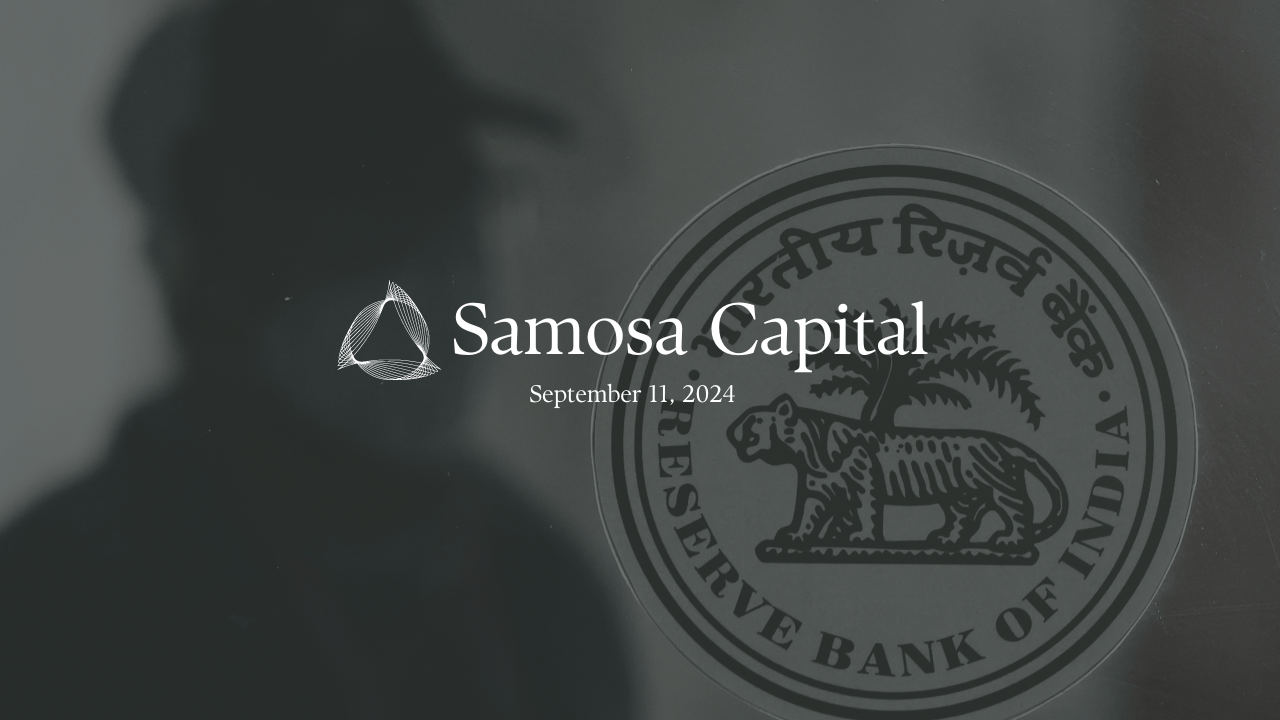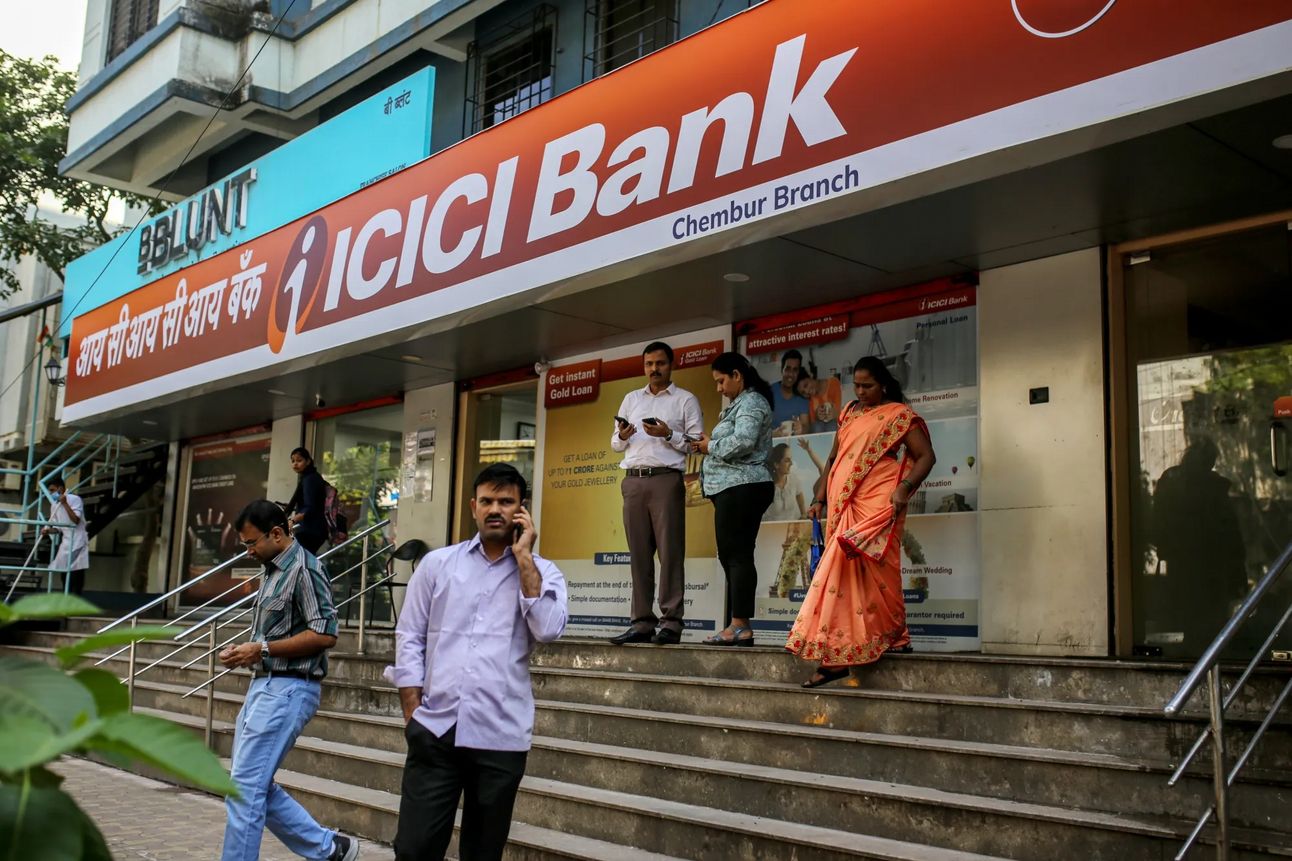
Hello. A credit-deposit mismatch is holding back India’s banking system, and Indian growth as a whole, from its full potential. We’ll explain what is driving this, and then close with Gupshup, a round-up of the most important headlines
BTW: I interviewed Deputy Governor Viral Acharya a while back at NYU Stern, and he told me he had an innovative way of tracking inflation at the RBI when he felt data was lacking context. You’ll never guess what it is. (Answer at bottom)

Markets

Read here for an appendix on the above.
Mismatch

Throughout the summer, India’s growth has been hindered by a credit-deposit growth mismatch, which has anchored down India’s banks’ earnings. At its core, credit growth represents the demand for loans. When credit growth accelerates faster than deposits, the economy faces (1) higher borrowing costs as banks need to borrow just to lend, which reduces margins across the economy, and (2) increased risk as loan growth becomes excessively reliant on more loans rather than real deposits.
Several factors contribute to this trend. The RBI does not mandate a specific credit-deposit ratio, only recommending a target of 70-80 percent. Additionally, the gap between credit and deposit growth could be due to the currency in circulation and RBI intervention in the FX market, with the central bank buying rupees to maintain competitiveness. The budget’s emphasis on infrastructure spending, alongside financial boosts for small states and farmers, has further fueled loan demand.
Why aren’t deposits growing as fast? One issue is the government’s aggressive taxation of savers, with the proceeds kept out of the financial system. Lenders are under pressure from the finance ministry to conduct "special drives" to raise deposits, while also being constrained by the 2024 Budget’s requirements to hold more cash and government securities. Banks, like HDFC, have even resorted to limiting credit growth by selling billions in advances, such as HDFC’s recent sale of $1.2 billion to manage loan ratios.
Beyond government policies, the RBI has also contributed to the slowdown by restricting money supply growth. RBI liabilities show that the money supply grew by 7.4 percent year-over-year in June, compared to a 9.7 percent increase in GNP. Last month, money growth slowed further to 4 percent.

The stock market is also vacuuming money away from banks. Blue-collar workers, who would typically deposit excess cash in banks, are now investing in the market instead. Deposits provide low-cost funding, but the millions of Indians moving their money into the stock market could hinder efforts to meet the 7+ percent growth target.
Why the shift to the stock market? Savings accounts offer an average return of 2.5 percent, while CDs provide up to 6.5 percent with long-term commitments. Meanwhile, the stock market has risen 26 percent in the past year. There are now 198 million mutual fund accounts, with retail investors owning 60 percent of all fund assets. Economists see further growth potential here, as Indian household savings in non-banks remain lower than in other Asian countries like Korea and Taiwan, which could sustain slow deposit growth.
To address this, Finance Minister Sitharaman and RBI Governor Das have called on banks to find ways to boost deposits, particularly to manage liquidity concerns.

Macro
U.S. inflation falls to 2.5 percent in August year-over-year, giving the Federal Reserve more room to cut rates quickly
Core inflation remained at 3.2 percent, the same as the previous month
Job hirings missed expectations in August for the second month in a row, sparking economic slowdown fears
Kenyan airport employees begin strike to disrupt Adani operating Nairobi’s airport (BBG)
Aviation workers want the privately initiated proposal to be stricken
Kenya is attempting to privatize other factors of the economy to grow revenue, similar to tax
India is targeting a $500B electronics sector by 2030 (BBG)
More production of iPhones in India plus tech investment growth has led to Modi calling for further foreign direct investment in a rapidly growing sector
India to impose up to 30% steel tariffs on Vietnam and China (Economic Times)
Tariffs of 12 to 30% will be placed on Asian countries to protect the local industry
Weakening demand and growing supply in China has hurt Indian manufacturers
Equities
Bank stock hedges are now cheapening, representing bullish flow (BBG)
Bearish options outstanding dropped relative to bullish, showing speculative action happening
Potential banking liquidity easing could boost bank valuations even if interest income falls
Tata Motors weakens as UBS sees British unit Jaguar dropping (BBG)
UBS sees rising discounts on luxury cars to hurt Jaguar earnings, with weak car order book
Indian pharma expected to get boost from US bill (BBG)
The Biosecure Bill will ban certain Chinese drugs leading to the growth of Indian manufacturers
Alts
Semiconductor ambitions continue to grow with L&T joining chip effort (BBG)
The tech-to-electronics company is investing $300M to create a new fab manufacturer
Chipmakers diversifying outside of China and Taiwan have set targets on India
Ayushman Bharat insurance schemes cover seniors up to $6,250 (Economic Times)
Nearly 60M seniors will be covered with the new insurance scheme financed through government spending but also private investment
Renewable projects seek commitments from banks and PE firms (BBG)
The renewable energy ministry has asked banks, developers, and PE to specify commitment through 2030; so far non-fossil accounts for 46% of the country’s total installed renewable capacity
Politics
Manipur blocks internet for 5 days due to unrest and violence (BBG)
There were students clashing due to ethnic group violence, leading to police and student skirmishes
Manipur is attempting to stop the spread of misinformation and hate messages
Ukraine wants India to play a more active role in ending war (BBG)
Ukraine’s ambassador in New Delhi said that India should have an active hand if they want a permanent UN seat; a peace summit held by Nov. 2024 has been proposed by Ukraine
India’s foreign minister, Subrahmanyan Jaishankar, appears to be reluctant to be involved
India’s market watchdog, arguably, needs stricter control (BBG)
SEBI Chair Buch is the first lead from the private sector and is yet to respond to Hindenburg or opposition parties clamoring for more transparency with financial holdings
Right now, assets are not required to be put in blind trusts or reported on, leading to failures
Oh, and Acharya noted he would routinely go to the street markets and ask for the price of pao bhaji, a famous Indian meal that uses nearly a dozen different common ingredients and vegetables that are also used in most other Indian dishes. Through this, Acharya dubbed the “pao bhaji index” as his way to keep a pulse on food inflation.

From our sponsor.
Are you looking for an innovative approach to help your student succeed in middle and high school? Redwood River Academy offers personalized, relationship-focused tutoring to foster long-term growth and academic excellence. We are giving away a free consultation to the first 100 parents who sign up here.

See you next week.
Disclaimer: This is not financial advice or recommendation for any investment. The Content is for informational purposes only, you should not construe any such information or other material as legal, tax, investment, financial, or other advice.
1 USD = 83.99 Indian Rupee